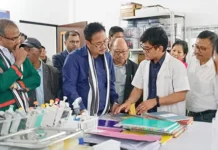[ Dr Rapa Sangno ]
During the recently concluded two-day special licence/registration drive under the Food Safety and Standards Act, 2006 in the Tezu township area of Lohit district, it became evident that there is significant confusion between a trading licence and an FSSAI food license among food business operators (FBO). Upon further inquiry, it was found that this misconception is widely held by the entire FBO community across the state. This misunderstanding has been creating challenges for FSSAI field agents in enforcing food safety compliance, often leading to delays in starting businesses and unnecessary bureaucratic complications.
In light of the ongoing confusion, I aim to simplify the complexities of obtaining an FSSAI food licence/registration as straightforwardly as possible.
Key differences
- Trading licence:
- a) Eligibility: Only APST (Arunachal Pradesh Scheduled Tribe) individuals are eligible.
- b) Purpose: Permits a person to engage in trade or business within the state.
- c) Issuing authority: Local administrative bodies such as the deputy commissioner’s office or town councils, through the trade development officer.
- FSSAI food licence:
- a) Eligibility: Open to anyone, regardless of domicile or ethnicity.
- b) Purpose: Ensures food safety, hygiene, and compliance with food safety laws for food business operators.
- c) Issuing authority: Food Safety and Standards Authority of India (FSSAI) through designated officers or food safety officers.
Why the confusion?
The primary source of confusion stems from the perception that both licences serve the same purpose. While trading licence pertains to local trade laws, the FSSAI food licence ensures compliance with food safety regulations. Some food business operators mistakenly believe that possessing a trading licence exempts them from obtaining an FSSAI food licence.
Process of obtaining an FSSAI food licence
To simplify the process for aspiring food entrepreneurs, here is a step-by-step guide to obtaining an FSSAI food licence:
- Determine the type of licence:
- a) Registration: For small-scale businesses with an annual turnover of up to Rs 12 lakhs.
- b) State licence: For medium-sized businesses with an annual turnover between RS 12 lakhs and Rs 20 crores.
- c) Central licence: For larger businesses with a turnover exceeding Rs 20 crores or those operating across multiple states.
- Prepare required documents:
- a) Identity proof (Aadhaar, PAN card, etc)
- b) Address proof of the business premises (land allotment document, lease agreement, etc.)
- c) Passport-size photographs of the proprietor.
- d) Proof of business ownership (eg, partnership deed, certificate of incorporation).
Supporting documents like NOC from local authorities, water testing reports, etc, depending on the type of business.
Note: For basic registration, only an Aadhaar card, PAN card, and passport-size photograph need to be furnished.
- Submit application online:
- a) Visit the official FSSAI website (https://foodlicensing.fssai.gov.in/).
- b) Register as a new user and log in.
- c) Fill in the application form and upload the required documents.
- d) Pay the applicable fee.
- Inspection and approval:
*Authorities may inspect the premises to verify compliance with safety and hygiene standards.
*Upon successful verification, the licence is issued.
By clarifying these distinctions and providing a clear process for obtaining the FSSAI food licence, FBOs can ensure compliance with both local and national regulations. This clarity will not only facilitate smoother business operations but also help maintain the highest standards of food safety in Arunachal Pradesh. (Dr Rapa Sangno is Food Safety Officer, Tezu, Lohit district.)


